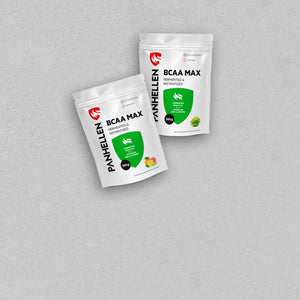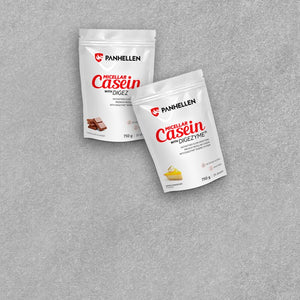ALL ABOUT CREATINE SUPPLEMENTATION

Who is creatine good for and why? Is it true that it is watering? What forms are there and which is the best? Get to know the facts!
In recent times, dietary supplements containing creatine have conquered the sports world and are now an essential part of the diet of many athletes. The effectiveness of creatine is scientifically proven; it is a legal performance-enhancing formula when used professionally.
WHAT IS CREATINE?
Creatine is an organic compound that plays a major role in the energy supply of cells and tissues (mainly muscle tissue) . Its natural sources are foods with a high protein content, such as meat (mainly pork and beef) and fish (herring, salmon, tuna). The proteins found in food are broken down into amino acids by digestive enzymes, so the kidney, liver and pancreas can produce creatine from different amino acids (arginine, glycine, methionine). The body's total creatine reserve is approx. 95 percent of it is contained by muscle fibers, so-called in the form of phosphocreatine.
The body of a 70 kg person is approx. It can store 120 g of creatine. The body's creatine loss is on average 2-3 percent per day, which leaves the body in urine in the form of creatinine. In addition to natural sources, the emptied amount can also be replaced with dietary supplements.
FOR WHOM AND WHY IS CREATINE SUPPLEMENTATION IMPORTANT?
Creatine helps regenerate ATP in the muscles. ATP , i.e. adenosine triphosphate, is the body's main energy supplier: it transports energy within the cells . As soon as it is used up, it is produced again through various energy supply processes. Its regeneration can take place both aerobically (with the presence of oxygen) and anaerobically (without the presence of oxygen). The latter process can be divided into two ways:
- to the anaerobic lactacid pathway, which is supported by creatine phosphate, and during which no lactic acid is produced;
- and anaerobic glycolysis, which involves the formation of lactic acid.

It is important to know that ATP does not provide energy for an extended period of time, it is only sufficient for a few seconds of exertion . However, the creatine content of the muscles (in a lucky case) is several times its ATP concentration, thereby helping its regeneration. (Note: in the case of muscle work exceeding 8-10 seconds, energy is already provided by carbohydrates and fatty acids; this is called anaerobic glycolysis.)
Therefore, creatine supplementation and the appropriate creatine concentration in the blood and muscles play a huge role in ATP regeneration. The use of creatine-containing dietary supplements can be useful mainly in the case of short-term, repetitive muscle work, such as weight training or sprint numbers. If enough creatine phosphate is available to the body, the energy-providing processes can take place quickly and unhindered. This results in more efficient muscle contraction and muscle work, thereby increasing muscle strength and performance.
DISPLAYING MYTHS RELATED TO "WATERING".
In addition to providing energy, creatine has many other benefits for athletic purposes. The free creatine found in muscle fibers attracts water, thereby hydrating the cells. This increase in cell volume represents a so-called building stimulus for the body . In addition to adequate protein intake, creatine supplementation can also contribute to increasing muscle mass . The transport of creatine into muscle cells is facilitated by high insulin levels and a high protein content in the diet. (Insulin levels increase after eating carbohydrate-containing food.)
TYPES OF CREATINE - WHICH IS BEST?
We do not find a big difference between the absorption of chemical compounds containing creatine, however, it is always necessary to take into account the proportion of free, i.e. actively absorbed, creatine in the given formula. The majority of studies have demonstrated the effectiveness of creatine monohydrate over creatine phosphate, creatine citrate and creatine ethyl ester compounds.
Although the ATP formation is supported by the creatine phosphate molecule, creatine phosphate-containing preparations do not help charging better . This is possible because the phosphate bond means "extra work" for the body, as it must first dissolve the chemical bond, and only then can it access the actively absorbed creatine. In the case of creatine monohydrate, this breakdown and conversion is not necessary! That's why it's more efficient.
THERE IS A DIFFERENCE BETWEEN CREATINE MONOHYDRATE PREPARATION!
In addition to the rate of utilization , the purity and controlled quality of the active ingredient is also an important aspect. Creatine products from unreliable sources may contain the possibility of contamination (e.g. creatinine). Creatine monohydrate products containing the Creapure® active ingredient contain the least impurities and the most concentrated creatine.
TOXIC SUBSTANCES HAVE BEEN FOUND IN CERTAIN CREATINE PREPARATION!
A few years ago, renowned professional forums drew attention to the fact that some creatine preparations contain toxic substances, i.e. poisons, in addition to creatine! The above applies to pure creatine active ingredients, but it is another matter what else the specific product you buy contains.
The food supplement market typically works in such a way that product distribution companies do not manufacture raw materials, but plan the active ingredient composition, purchase the ingredients, and assemble and package the finished product. So there are large companies that produce raw materials. In the case of creatine, there are about 5 large companies in the world that mass-produce creatine and almost all distribution companies buy from these companies. There are two American, two Chinese and one German manufacturers that supply creatine raw materials to 90% of all distributors. During the aforementioned investigation, it was revealed that EXCEPT THE GERMAN COMPANY, THE CREATINE OF ALL MANUFACTURERS CONTAINED AN UNACCEPTABLE NUMBER AND QUANTITY OF TOXIC SUBSTANCES.
This company is AlzChem Trostberg GmbH, the manufacturer of Creapure®, the verifiably purest creatine monohydrate, protected by a world patent . A distributor may be misusing the name, advertising “Creapure” but not actually using, or not 100% of, this exceptionally pure creatine. Look for the Creapure® trademark shown in the picture on the packaging of the creatine product, and to be sure, check the ingredients on the label (back) to see if the product really only contains Creapure® creatine monohydrate and not other, or mixed with other, toxic substances creatine. This is not just a matter of quality, but of whether you are consuming potentially toxic substances . This does not mean that all Creapure® creatine contains toxic substances. There may be other, pure preparations as well. In the case of Creapure®, however, purity has been proven.

EFFECT, SIDE EFFECT
Some studies have shown that not everyone responds to creatine supplementation in the same way. Some experienced a lower creatine increase, but it is important to mention that they also had better performance - just to a lesser extent. The possible side effects of creatine have been researched for years. According to tests , it is safe to use . There is no need to fear kidney or liver damage or malignant changes when using pure, controlled quality creatine monohydrate as prescribed. Some people report muscle cramps and digestive symptoms. These unpleasant effects can be avoided by using creatine several times a day in smaller doses (3-5 doses/occasion).
WHAT SHOULD YOU CONSUME WITH CREATINE DIETARY SUPPLEMENT?
If you use a dietary supplement containing creatine, it is worth paying attention to the adequate intake of folic acid and vitamin B12 , because their lack can reduce creatine synthesis. Vitamin B12 is mainly found in foods of animal origin and in fermented plant-based foods, such as sauerkraut. Spirulina and Chlorella microalgae are also an excellent plant source of vitamin B12 in the vegan diet .
Foods with a high folic acid content include offal (e.g. pork liver), wheat germ, oily seeds (e.g. peanuts, sunflower seeds), legumes (e.g. lentils, chickpeas), green leaves (spinach, sorrel), cabbages (broccoli, cauliflower), orange (juice) belong.

CREATINE CREAPURE®
The purest and best quality micronized creatine monohydrate, patented formula:
- For competitive athletes, hobbyists, to increase muscle mass, increase strength and increase endurance.
- Energization and performance enhancement
- Increasing muscle mass and strength
- German top quality from AlzChem Trostberg GmbH
PANHELLEN CREATINE is made with the patented Creapure® technology, the product contains 100% ultra-pure creatine monohydrate, without "dilution" with other creatines. When mixed with water, it has no aftertaste (it resembles mineral-rich spring water), so adding flavoring additives is not justified. Thus, the product contains 100% of the pure active ingredient.













